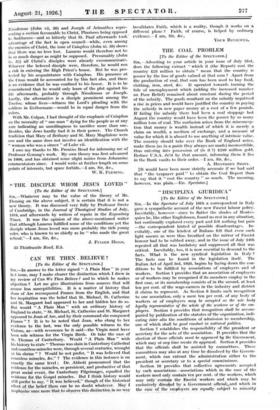THE COAL PROBLEM
[To the Editor of the SPECTATOR.] SIR,—Adverting to your article in your issue of July 31st, does the following extract "which it (the Report) cost the Country 123 million to obtain" mean that the country is poorer by the loss of goods valued at that sum ? Apart from the production of coal, that sum has been used to buy food, clothing, iron, steel, &c. It operated towards turning the tide of unemployment which (adding the increased number on Poor Relief) remained about constant during the period of the subsidy. The goods resultant on the subsidy negatived a rise in prices and would have justified the country in paying the subsidy in new paper money at a cost of a few pounds. If failing the subsidy there had been a coal stoppage last August the country would have been the poorer by so many million tons of coal. The confusion arises from the misconcep- tion that money is wealth instead of which it is merely a claim on wealth, a medium of exchange, and a measure of value for which it is absurd to use anything of intrinsic value. The country should take over the Bank of England notes, make them (as in a panic they always arc made) inconvertible, thus entering into possession of (is it'?) £200 million gold. Reduce U.S.A. debt by that amount, informing them it lies in the Bank vaults to their order.—I am, Sir, &c., A. RENTIIORN STOTT.
[It would have been more strictly accurate if we had said that "the taxpayer paid" to obtain the Coal Report than to say that it "cost the country" so much. The meaning, however, was plain.—En. Spectator.]


































 Previous page
Previous page